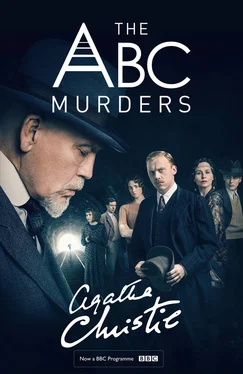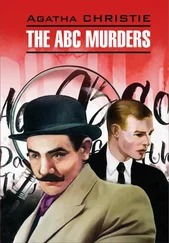A good job too, I thought privately. But I would not for the world have hurt Poirot’s feelings by saying so.
Instead I asked if he still practised his profession on occasion.
‘I know,’ I said, ‘that you actually retired years ago—’
‘C’est vrai. To grow the vegetable marrows! And immediately a murder occurs—and I send the vegetable marrows to promenade themselves to the devil. And since then—I know very well what you will say—I am like the prima donna who makes positively the farewell performance! That farewell performance, it repeats itself an indefinite number of times!’
I laughed.
‘In truth, it has been very like that. Each time I say: this is the end. But no, something else arises! And I will admit it, my friend, the retirement I care for it not at all. If the little grey cells are not exercised, they grow the rust.’
‘I see,’ I said. ‘You exercise them in moderation.’
‘Precisely. I pick and choose. For Hercule Poirot nowadays only the cream of crime.’
‘Has there been much cream about?’
‘Pas mal. Not long ago I had a narrow escape.’
‘Of failure?’
‘No, no.’ Poirot looked shocked. ‘But I—I, Hercule Poirot, was nearly exterminated.’
I whistled.
‘An enterprising murderer!’
‘Not so much enterprising as careless,’ said Poirot. ‘Precisely that—careless. But let us not talk of it. You know, Hastings, in many ways I regard you as my mascot.’
‘Indeed?’ I said. ‘In what ways?’
Poirot did not answer my question directly. He went on:
‘As soon as I heard you were coming over I said to myself: something will arise. As in former days we will hunt together, we two. But if so it must be no common affair. It must be something’—he waved his hands excitedly—‘something recherché—delicate—fine…’ He gave the last untranslatable word its full flavour.
‘Upon my word, Poirot,’ I said. ‘Anyone would think you were ordering a dinner at the Ritz.’
‘Whereas one cannot command a crime to order? Very true.’ He sighed. ‘But I believe in luck—in destiny, if you will. It is your destiny to stand beside me and prevent me from committing the unforgivable error.’
‘What do you call the unforgivable error?’
‘Overlooking the obvious.’
I turned this over in my mind without quite seeing the point.
‘Well,’ I said presently, smiling, ‘has this super crime turned up yet?’
‘Pas encore. At least—that is—’
He paused. A frown of perplexity creased his forehead. His hands automatically straightened an object or two that I had inadvertently pushed awry.
‘I am not sure,’ he said slowly.
There was something so odd about his tone that I looked at him in surprise.
The frown still lingered.
Suddenly with a brief decisive nod of the head he crossed the room to a desk near the window. Its contents, I need hardly say, were all neatly docketed and pigeon-holed so that he was able at once to lay his hand upon the paper he wanted.
He came slowly across to me, an open letter in his hand. He read it through himself, then passed it to me.
‘Tell me, mon ami,’ he said. ‘What do you make of this?’
I took it from him with some interest.
It was written on thickish white notepaper in printed characters:
Mr Hercule Poirot,—You fancy yourself, don’t you, at solving mysteries that are too difficult for our poor thick-headed British police? Let us see, Mr Clever Poirot, just how clever you can be. Perhaps you’ll find this nut too hard to crack. Look out for Andover, on the 21st of the month.
Yours, etc.,
A B C.
I glanced at the envelope. That also was printed.
‘Postmarked WC1,’ said Poirot as I turned my attention to the postmark. ‘Well, what is your opinion?’
I shrugged my shoulders as I handed it back to him.
‘Some madman or other, I suppose.’
‘That is all you have to say?’
‘Well—doesn’t it sound like a madman to you?’
‘Yes, my friend, it does.’
His tone was grave. I looked at him curiously.
‘You take this very seriously, Poirot.’
‘A madman, mon ami, is to be taken seriously. A madman is a very dangerous thing.’
‘Yes, of course, that is true…I hadn’t considered that point…But what I meant was, it sounds more like a rather idiotic kind of hoax. Perhaps some convivial idiot who had had one over the eight.’
‘Comment? Nine? Nine what?’
‘Nothing—just an expression. I meant a fellow who was tight. No, damn it, a fellow who had had a spot too much to drink.’
‘Merci, Hastings—the expression “tight” I am acquainted with it. As you say, there may be nothing more to it than that…’
‘But you think there is?’ I asked, struck by the dissatisfaction of his tone.
Poirot shook his head doubtfully, but he did not speak.
‘What have you done about it?’ I inquired.
‘What can one do? I showed it to Japp. He was of the same opinion as you—a stupid hoax—that was the expression he used. They get these things every day at Scotland Yard. I, too, have had my share…’
‘But you take this one seriously?’
Poirot replied slowly.
‘There is something about that letter, Hastings, that I do not like…’
In spite of myself, his tone impressed me.
‘You think—what?’
He shook his head, and picking up the letter, put it away again in the desk.
‘If you really take it seriously, can’t you do something?’ I asked.
‘As always, the man of action! But what is there to do? The county police have seen the letter but they, too, do not take it seriously. There are no fingerprints on it. There are no local clues as to the possible writer.’
‘In fact there is only your own instinct?’
‘Not instinct, Hastings. Instinct is a bad word. It is my knowledge—my experience—that tells me that something about that letter is wrong—’
He gesticulated as words failed him, then shook his head again.
‘I may be making the mountain out of the anthill. In any case there is nothing to be done but wait.’
‘Well, the 21st is Friday. If a whacking great robbery takes place near Andover then—’
‘Ah, what a comfort that would be—!’
‘A comfort?’ I stared. The word seemed to be a very extraordinary one to use.
‘A robbery may be a thrill but it can hardly be a comfort!’ I protested.
Poirot shook his head energetically.
‘You are in error, my friend. You do not understand my meaning. A robbery would be a relief since it would dispossess my mind of the fear of something else.’
‘Of what?’
‘Murder,’ said Hercule Poirot.
Chapter 2 2 Not from Captain Hastings’ Personal Narrative 3 Andover 4 Mrs Ascher 5 Mary Drower 6 The Scene of the Crime 7 Mr Partridge and Mr Riddell 8 The Second Letter 9 The Bexhill-on-Sea Murder 10 The Barnards 11 Megan Barnard 12 Donald Fraser 13 A Conference 14 The Third Letter 15 Sir Carmichael Clarke 16 Not from Captain Hastings’ Personal Narrative 17 Marking Time 18 Poirot Makes a Speech 19 By Way of Sweden 20 Lady Clarke 21 Description of a Murderer 22 Not from Captain Hastings’ Personal Narrative 23 September 11th. Doncaster 24 Not from Captain Hastings’ Personal Narrative 25 Not from Captain Hastings’ Personal Narrative 26 Not from Captain Hastings’ Personal Narrative 27 The Doncaster Murder 28 Not from Captain Hastings’ Personal Narrative 29 At Scotland Yard 30 Not from Captain Hastings’ Personal Narrative 31 Hercule Poirot Asks Questions 32 And Catch a Fox 33 Alexander Bonaparte Cust 34 Poirot Explains 35 Finale About Agatha Christie The Agatha Christie Collection About the Publisher Конец ознакомительного фрагмента. Текст предоставлен ООО «ЛитРес». Прочитайте эту книгу целиком, купив полную легальную версию на ЛитРес. Безопасно оплатить книгу можно банковской картой Visa, MasterCard, Maestro, со счета мобильного телефона, с платежного терминала, в салоне МТС или Связной, через PayPal, WebMoney, Яндекс.Деньги, QIWI Кошелек, бонусными картами или другим удобным Вам способом.
Читать дальше












